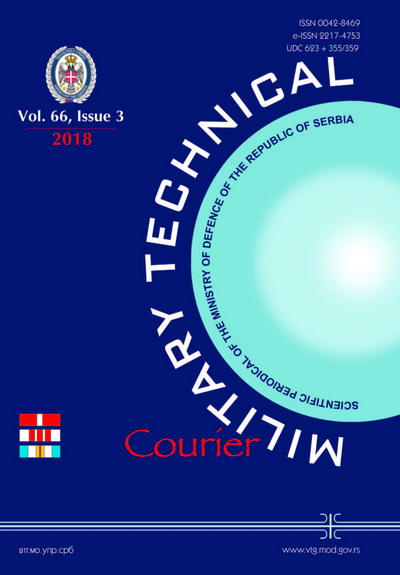Serious games in military applications
Abstract
Serious games as one of the most important trends in e-learning are presented in this paper. An intensive use of information and communication technologies has led to major changes in traditional military education. One of these changes is the use of serious games for simulating the real military environment. This review paper presents several definitions and classifications of serious games, the difference between serious and entertainment games, and considers their military applications in training and simulation systems as well as in education.
References
Abt, C.C. 1987. Serious games. University Press of America.
Alvarez, J., & Michaud, L. 2008. Serious Games: Advergaming, edugaming, training and more. IDATE.
America's Army. 2010. Available at: http://www.americasarmy.com. Accessed: 22.01.2018.
Chen, S., & Michael, D. 2005. Serious Games: Games that Educate, Train and Inform. Thomson Course Technology.
Cruz-Cunha, M.M. 2012. Handbook of Research on Serious Games as Educational, Business and Research Tools. IGI Global. Available at: https://doi.org/10.4018/978-1-46660-149-9.
Djaouti, D., Alvarez, J., & Jessel, J. 2011. Classifying serious games: the G/P/S model. In: R. Tennyson & P. Felicia Eds., Handbook of Research on Improving Learning and Motivation Trough Educational Games: Multidisciplinary Approaches. IGI Global, pp.118-136. Available at: https://doi.org/10.4018/978-1-60960-495-0.ch006.
Dobrovsky, A., Borghoff, U.M., & Hofmann, M. 2017. Applying and Augmenting Deep Reinforcement Learning in Serious Games through Interaction. Periodica Polytechnica Electrical Engineering and Computer Science, 61(2), p.198. Available at: https://doi.org/10.3311/ppee.10313.
Doujak, G. 2015. Serious games and digital game based learning, Spiele-basierte E-Learning Trends der Zukunft. GRIN Verlag.
El Azizi, L., & Arbai, A. 2017. Serious Games for the Development of Learning. Transactions on Machine Learning and Artificial Intelligence, 5(4). Available at: https://doi.org/10.14738/tmlai.54.3216.
Games for Health Conference. 2008. Baltimore, USA.
Hussain, T.S., & Coleman, S.L. 2014. Design and Development of Training Games. Cambridge: Cambridge University Press, pp.1-5. Available at: https://doi.org/10.1017/cbo9781107280137.001.
Jansiewicz, D. 1973. The New Alexandria simulation: A serious game of state and local politics. Canfield Press.
Jaume-I-Capó, A., & Samčović, A. 2015. Interactive multimedia system using serious game for users with motor disabilities. Telfor Journal, 7(2), pp.97-102. Available at: https://doi.org/10.5937/telfor1502097j.
Marczewski, A. 2013. Gamification: A simple introduction.
Matteas, M. 2008. Procedural Literacy: Educating the New Media Practitioner. In: D. Davidson Ed., Beyond Fun: Serious Games and Media. ETC Press.
Pringle, R. 2007. Gaming technology impacting military training. Military Training Technology, 12(6).
Roman, P.A., & Brown, D. 2008. Games–just how serious are they. In: The interservice/industry training, simulation & education conference (I/ITSEC), 2008(1).
Sawyer, B. 2009. Serious Games: Improving Public Policy through Game-based Learning and Simulation. Woodrow Wilson International Center for Scholars.
Smith, R. 2007. Military modeling, Handbook of dynamic systems modeling. CRC Press.
Smith, R. 2008a. The future of virtual environment training in the army. In Handbook of virtual environment training in the army. Greenwood Publishing Group.
Smith, R. 2008b. New Technology for M&S: Web 2.0. In IT Services, HPC, Games, OSD/ROK Defense M&S Workshop. Korean Institute for Defense Analyses.
Yildirim, S. 2010. Serious game design for military training. In Games: Design and Research Conference. Volda University College.
Valentine, K.D., & Jensen, L.J. 2016. Examining the Evolution of Gaming and Its Impact on Social, Cultural, and Political Perspectives. Hershey, PA: IGI Global. Available at: https://doi.org/10.4018/978-1-5225-0261-6.
Zyda, M. 2005. From visual simulation to virtual reality to games. Computer, 38(9), pp.25-32. Available at: https://doi.org/10.1109/mc.2005.297.
Žižović, M., & Plećić, K. 2017. Muticriteria assessment of possible use of computer games in teaching. Vojnotehnički glasnik / Military Technical Courier, 65(3), pp.641-650. Available at: https://doi.org/10.5937/vojtehg65-13000.
Proposed Creative Commons Copyright Notices
Proposed Policy for Military Technical Courier (Journals That Offer Open Access)
Authors who publish with this journal agree to the following terms:
Authors retain copyright and grant the journal right of first publication with the work simultaneously licensed under a Creative Commons Attribution License that allows others to share the work with an acknowledgement of the work's authorship and initial publication in this journal.
- Authors are able to enter into separate, additional contractual arrangements for the non-exclusive distribution of the journal's published version of the work (e.g., post it to an institutional repository or publish it in a book), with an acknowledgement of its initial publication in this journal.
- Authors are permitted and encouraged to post their work online (e.g., in institutional repositories or on their website) prior to and during the submission process, as it can lead to productive exchanges, as well as earlier and greater citation of published work (See The Effect of Open Access).

